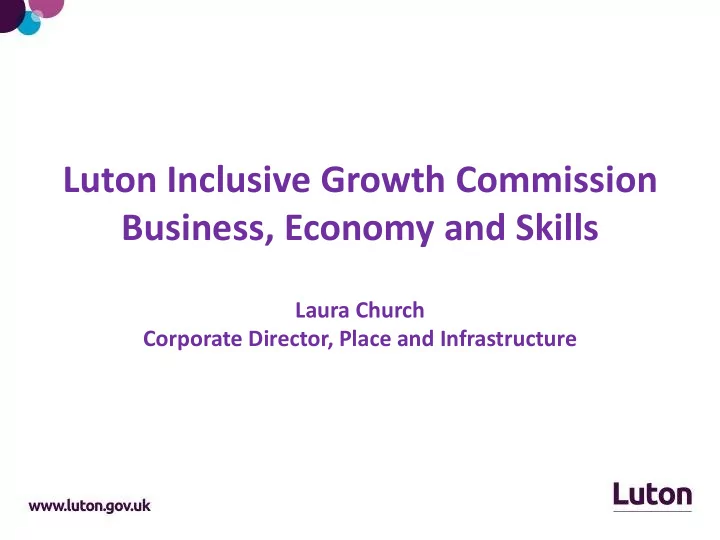

Luton Inclusive Growth Commission Business, Economy and Skills Laura Church Corporate Director, Place and Infrastructure
Business in Luton
Productivity and the Local Economy
Employment
Employment
Employment Groups 1-3 (Managers, Directors, Professionals & Technicians): Luton – 34.3% Very Low East – 46.1% GB – 45.8% Groups 4-5 (Admin, Secretarial and Skilled Trades): Luton – 22.4% A little high East – 21.5% GB – 20.6% Groups 6-7 (Carers, Leisure, Retail and Customer Service): Luton – 16.6% East – 16.2% GB – 16.7% Groups 8-9 (Process Plant, Machine Operators and Elementary Occupations): Luton – 26.7% Very high East – 16.3% GB – 16.9%
Unemployment Luton National Regional In Employment 70% 75% 78% Self-Employed 9.5% 10.6% 11.6% Unemployed 5.6% 4.3% 3.7% Economically Inactive 25.5% 21.6% 19.3%
Unemployment by Ward 3.5 3.0 2.5 2.0 1.5 Claimant Count Rate 1.0 0.5 0.0
Earnings Gross Weekly Median Earnings 700.0 600.0 500.0 400.0 Luton Residents Luton Workplace 300.0 England 200.0 100.0 0.0 2012 2013 2014 2015 2016 2017
Deprivation
Impact of Welfare Reform 2017 2020 Projection Households in Crisis 0.5% 11.1% Households at Serious Financial Risk 25.1% 35% Struggling Households 8.5% 10.2% Coping Households 65.8% 43.8%
Education & Skills Luton National Regional GCSE A*-C Inc. English 49.5% 58.2% and Maths NVQ Level 4+ 33.9% 39% 35% NVQ Level 2+ 66.7% 75% 73% No Formal 12.9% 7.7% 7.2% Qualifications 5 Basic Digital Skills 76% 78%
Gaps in Our Knowledge Further research is needed to inform our current understanding of some of the economic drivers of inclusive growth including: • The underlying reasons for low productivity, and a lack of high-quality jobs in Luton • The reasons for unemployment and economic inactivity and the barriers into work for many Luton residents • The reasons for lower educational attainment and the impact this has upon future opportunities for work and prosperity
Business, Economy and Skills Summary • Luton’s business community is strong and growing and is becoming more like the rest of the UK economy with more service industries and less manufacturing • Unemployment and economic inactivity are higher in Luton than nationally with a significantly higher proportion of inactivity among those staying at home to care for family • Luton has a higher proportion of low-paid work and a lower share of high-quality jobs in professional and managerial sectors • Productivity in Luton is low and falling • Average earnings in Luton are significantly lower than the regional level and this contributes to growing deprivation and poverty • An increasing number of households are set to be at serious financial risk and more than a third of children are in poverty • Educational attainment is lower in Luton across the board than nationally and regionally and access to the best quality higher education is also lower
Recommend
More recommend